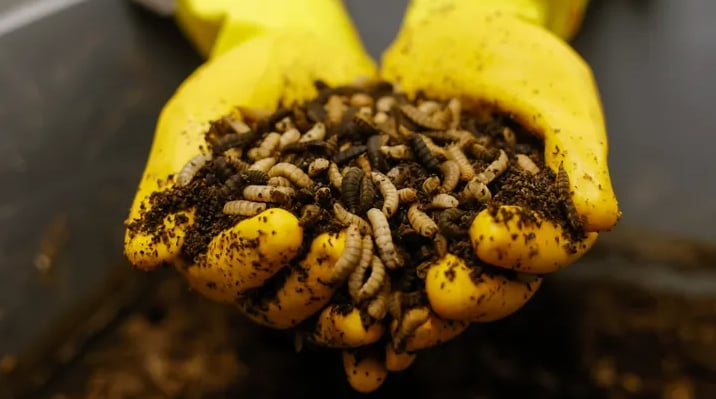November 26, 2025 | 00:07 GMT +7
November 26, 2025 | 00:07 GMT +7
Hotline: 0913.378.918
November 26, 2025 | 00:07 GMT +7
Hotline: 0913.378.918

Black Soldier Fly larvae inside the Entocycle insect farming laboratory in London UK, on Wednesday, Oct. 26, 2022. The startup wants big business to adopt its insect farming technology. Photo: Carlos Jasso/Bloomberg via Getty Images.
Farmers in the United Kingdom have started using artificial intelligence (AI) systems to help monitor their fields and protect them from dangerous creatures — such as animals and insects.
"It’s pretty much like having a real human sitting here 24/7 and listening when we tell it to listen," developer Conrad Young said of his Chirrup system, which can identify bird species from recordings of chirps.
The British-made program analyzes the "dawn chorus," or the early morning chirping that occurs when birds greet the sunrise. With each successive recording, the program is able to better identify all the birds in the area and help create a detailed database of the total biodiversity in the area.
Part of the key to the program’s success is that it doesn’t actually look at sound but at a spectrogram — a picture of a sound. The program has a 100-meter radius, according to The Morning News.
The map also includes other types of animals, including insects — far more dangerous pests that also present an issue for farmers who aim to remain organic and want to avoid turning to pesticides to protect their crops.
"They tell you what insects are about and obviously we are organic, so we don't use any insecticides, or sprays or anything like that," Peter Cheek, a farmer, told the BBC. "So if we have got those insects and the birds are eating them, they are also eating other bugs that are trying to damage the crops."
Cheek said his farm has achieved more healthy soil thanks to Chirrup, which he also noted provided a more affordable option to tackle the issue.
The program presents a more unique method of crop protection than other similar efforts, such as the use of AI-powered programs to protect endangered animals in Africa from poaching through the use of cameras and more advanced computer vision.
Another system in Africa aims to use AI to improve crop yields and help the continent handle environmental shocks, such as drought and climate change.
(foxnews)

(VAN) Brazil's COP30 presidency pushed through a compromise climate deal on Saturday that would boost finance for poor nations coping with global warming but that omitted any mention of the fossil fuels driving it.

(VAN) Poultry farmers in the UK have been warned that they could face one of the worst winters yet for bird flu.

(VAN) Prices of main-crop paddy have risen sharply, with jasmine rice hitting 16,100 baht per tonne — the highest level in years.

(VAN) In Brazil, FAO unveiled a series of reports and initiatives showing how sustainable agrifood systems are a solution to the climate crisis.

(VAN) With names like neodymium and dysprosium, rare-earth elements sound exotic — and their perceived scarcity has only added to the mystique.

(VAN) In a new study published in Trends in Biotechnology, researchers used a gene-editing technology called CRISPR to increase a fungus's production efficiency and cut its production-related environmental impact by as much as 61%- all without adding any foreign DNA.

(VAN) A top official in Beijing’s Cop delegation says China is committed to clean energy – but US’s absence is a problem.